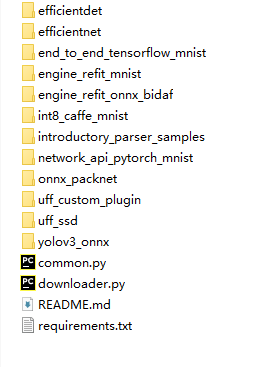TensorRT系列传送门(不定期更新): 深度框架|TensorRT
文章目录
楼主曾经在TensorRT(7):python版本使用入门一文中简要记录了python版本是序列化与反序列化加载模型的步骤,但因为环境以及TRT版本不同,API也有相当大的变化,这里重新记录下,在windows下,tensorrt8.2.3.0版本下,调用python的API是如何加载模型的。
实验案例:采用 yolov5的onnx模型,进行FP16量化保存模型。
代码案例均来自 TensorRT提供的sample中。
详细可见TensorRT-8.2.3.0\samples\python

一、序列化保存模型
与C++端序列化保存模型的步骤类似
- 1、首先定义个log 文件,然后创建一个runtime
TRT_LOGGER = trt.Logger(trt.Logger.WARNING)
runtime = trt.Runtime(TRT_LOGGER)
- 2、建立builder,设置maxBatchSize参数
builder = trt.Builder(TRT_LOGGER) # 创建一个builder
builder.max_batch_size = 1
- 3、配置config,如设置fp16等
config = builder.create_builder_config() # 创建一个congig
config.max_workspace_size = 1 << 20
config.set_flag(trt.BuilderFlag.FP16)
- 4、解析onnx文件,并通过config序列化生成一个network
network = builder.create_network(EXPLICIT_BATCH) # 创建一个network
parser = trt.OnnxParser(network, TRT_LOGGER)
model = open(onnx_file_path, 'rb')
if not parser.parse(model.read()):
for error in range(parser.num_errors):
print(parser.get_error(error))
network.get_input(0).shape = [1, 3, 640, 640]
print('Completed parsing of ONNX file')
print('Building an engine from file {}; this may take a while...'.format(onnx_file_path))
plan = builder.build_serialized_network(network, config)
with open(engine_file_path, "wb") as f:
f.write(plan)
print("Completed write Engine")
二、反序列化加载模型
在一中序列化建立好network后,可以调用deserialize_cuda_engine反序列化生成一个 engine
engine = runtime.deserialize_cuda_engine(plan)
print("Completed creating Engine")
如果加载保存在本地的trt模型,可以直接加载engine
if os.path.exists(engine_file_path):
# If a serialized engine exists, use it instead of building an engine.
print("Reading engine from file {}".format(engine_file_path))
with open(engine_file_path, "rb") as f, trt.Runtime(TRT_LOGGER) as runtime:
return runtime.deserialize_cuda_engine(f.read())
三、完整代码
完整代码都可在github上的官网samples查询。
onnx_to_tensorrt.py
def get_engine(onnx_file_path, engine_file_path=""):
"""Attempts to load a serialized engine if available, otherwise builds a new TensorRT engine and saves it."""
def build_engine():
"""Takes an ONNX file and creates a TensorRT engine to run inference with"""
with trt.Builder(TRT_LOGGER) as builder, builder.create_network(common.EXPLICIT_BATCH) as network, builder.create_builder_config() as config, trt.OnnxParser(network, TRT_LOGGER) as parser, trt.Runtime(TRT_LOGGER) as runtime:
config.max_workspace_size = 1 << 28 # 256MiB
builder.max_batch_size = 1
# Parse model file
if not os.path.exists(onnx_file_path):
print('ONNX file {} not found, please run yolov3_to_onnx.py first to generate it.'.format(onnx_file_path))
exit(0)
print('Loading ONNX file from path {}...'.format(onnx_file_path))
with open(onnx_file_path, 'rb') as model:
print('Beginning ONNX file parsing')
if not parser.parse(model.read()):
print ('ERROR: Failed to parse the ONNX file.')
for error in range(parser.num_errors):
print (parser.get_error(error))
return None
# The actual yolov3.onnx is generated with batch size 64. Reshape input to batch size 1
network.get_input(0).shape = [1, 3, 608, 608]
print('Completed parsing of ONNX file')
print('Building an engine from file {}; this may take a while...'.format(onnx_file_path))
plan = builder.build_serialized_network(network, config)
engine = runtime.deserialize_cuda_engine(plan)
print("Completed creating Engine")
with open(engine_file_path, "wb") as f:
f.write(plan)
return engine
if os.path.exists(engine_file_path):
# If a serialized engine exists, use it instead of building an engine.
print("Reading engine from file {}".format(engine_file_path))
with open(engine_file_path, "rb") as f, trt.Runtime(TRT_LOGGER) as runtime:
return runtime.deserialize_cuda_engine(f.read())
else:
return build_engine()










